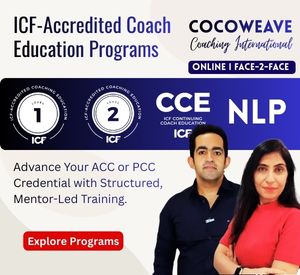As coaches, we take pride in staying present, holding space, and trusting the process. But let’s be real, bias comes with us. It travels quietly alongside our questions, our curiosity, and even our instincts, supporting us. It’s not a flaw. It’s part of being human.
Bias isn’t something to be ashamed of. It’s something to get to know.
Our brains are designed to take shortcuts. Biases help us process massive amounts of information quickly. But sometimes those shortcuts show up as assumptions — about who our clients are, what they value, or how they “should” move forward. Left unexamined, bias can shape how we show up in a session, often without us realizing it.
Bias Isn’t the Enemy
Something I often say in coach mentorship or education spaces is: “You’re not here to erase your biases; you’re here to become aware of them.” To gently surface them, stay curious, and make conscious choices in the moment. That’s the practice.
This kind of awareness lives at the heart of Embodies a Coaching Mindset (ICF Competency #2) and Cultivates Trust and Safety (ICF Competency #4). It’s part of how we co-create a space that invites wholeness, agency, and permission — for both the client and the coach.
Bias might show up in coaching when:
- We subtly steer the session based on what we think matters.
- We interpret tone or emotion through our own lens of meaning.
- We unconsciously prioritize what’s familiar or comfortable.
This isn’t about blame. It’s about care. It’s about staying with ourselves while we stay with the client.
Meet the OPEN Framework
I created OPEN as a trauma-aware, coach-friendly way to check in with yourself in the moment. It’s not a rigid protocol, it’s a gentle nudge. A reminder that presence is a practice.
This framework aligns with ICF Core Competencies five and six, Maintains Presence and Listens Actively, supporting us in coaching with both awareness and humility.
O – Observe Your Internal Reaction
That little flicker — curiosity, discomfort, urgency, judgment — is information. Not a mistake. Just something to notice.
Try asking: “What just showed up in me right now?”
P – Pause and Park Assumptions
When your mind starts to fill in blanks, gently set those thoughts aside. You don’t have to push them away, just choose not to follow them right now.
In the moment, ask yourself: “What story am I telling myself, and is it clouding what the client is saying?”
E – Expand Your Perspective
Take a breath. What else might be true here? Is there something you haven’t yet considered? This is where humility meets possibility.
What would change if you asked yourself, “If I zoom out, what else becomes visible?”
N – Name What’s in the Present for the Client
Return to their words, their pace, their meaning. Reflect what you’re hearing, not through your filter, but in their language.
Asking yourself, “What feels most present for them in this moment,” not only invites you out of assumption but also invites curiosity in, as a place to ask the client a question or share an observation.
You don’t need a dramatic pause or a lengthy reset. Sometimes all it takes is a moment. The choice to slow down and re-center. The more we practice this, the more intuitive it becomes.
Why It Matters
Unacknowledged bias can create subtle pressure in the coaching space. It can shift power dynamics, narrow possibilities, and unintentionally guide a client away from their own inner knowing.
But when we stay OPEN — when we observe, pause, expand, and name — we offer a more grounded, relational presence. We model reflection. We invite autonomy. We build safety, not by removing risk, but by staying aware and attuned.
And that’s what allows clients to show up fully, shift deeply, and choose freely.
In Your Coaching Backpack
As you take this with you into your next session, or into your own reflection, you might start to notice when bias tends to show up in your coaching — are there patterns? Are there certain topics, identities, or emotions that bring it forward? And when it does, what helps you come back to presence, to curiosity, to the client in front of you?
OPEN isn’t about calling ourselves out — it’s about calling ourselves in. Gently. Repeatedly. With kindness and compassion.
Because the more OPEN we are, the more space we create for safety, possibility, growth, and honest, human connection.
© 2025 Rosa Edinga. Used with permission. All rights reserved.
References:
International Coaching Federation. (2021). ICF Core Competencies. Retrieved from https://coachingfederation.org/core-competencies
Disclaimer
The views and opinions expressed in guest posts featured on this blog are those of the author and do not necessarily reflect the opinions and views of the International Coach Federation (ICF). The publication of a guest post on the ICF Blog does not equate to an ICF endorsement or guarantee of the products or services provided by the author.
Additionally, for the purpose of full disclosure and as a disclaimer of liability, this content was possibly generated using the assistance of an AI program. Its contents, either in whole or in part, have been reviewed and revised by a human. Nevertheless, the reader/user is responsible for verifying the information presented and should not rely upon this article or post as providing any specific professional advice or counsel. Its contents are provided “as is,” and ICF makes no representations or warranties as to its accuracy or completeness and to the fullest extent permitted by applicable law specifically disclaims any and all liability for any damages or injuries resulting from use of or reliance thereupon.
Authors
Post Type
Blog
Audience Type
Experienced Coaches, External Coaches, New Coaches, Professional Coaches
Topic
Discover - Your Coaching Career
Related Posts
The Power of Active Listening in Meaningful Coaching: Why Active Listening is the Most Essential Coaching Competency
Of all the foundational coaching competencies identified by the International Coaching Federation…
Allyship in Action: Coaching as a Catalyst for Change
Allyship is often framed as a value or an intention. In practice,…
Grace Under Fire: Building Stress Resilience for Coaches and High Achievers
There’s a unique kind of pressure that lives at the intersection of…







